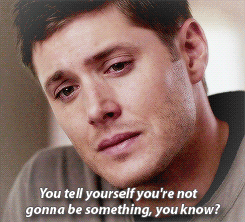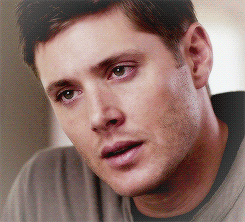subjecttochange8:I get what I’ve been doing lately, you know,with the yelling and the acting like a
subjecttochange8:I get what I’ve been doing lately, you know,with the yelling and the acting like a prison guard.It’s just….that’s not me.This is one of the scenes that convinces me it’s significant that Dean is the Winchester who’s been impersonated by shapeshifters, not once but twice. There’s an absolutely terrifying fluidity to Dean’s character that he’s acutely aware of and unsettled by, even if only subconsciously.“For you or Dad, the things I’m willing to do or kill, it’s just, uh…it scares me sometimes” (1.22). It’s my strong belief that in S4, the parallels explored are not only the ones between John Winchester and God (“I guess I’m not the man either of our dad wanted me to be” (4.16)) but also between John and Alastair. For both characters act as fathers to Dean, John as his biological parent and Alastair as the parent of the torturer that Dean becomes in Hell, and both John and Alastair’s characters conflates with Dean’s in extremely threatening ways. I know I always come back to “Dream A Little Dream of Me” (3.10), but that’s where I think we really get the foundation laid down for this parallel, because that episode is crucial to Dean confronting the conflation of his own identity with John’s, but at the same time, the black-eyed Dean he confronts in this episode is, though none of us know it yet, what he will become under Alastair’s paternal influence. And this takes place in an episode about a boy (Jeremy) who is terribly hurt by his father.3.10, like “Nightmare” (1.14), touches on the scars left behind by child abuse, the fact that just because the perpetrator is gone or stopped doesn’t mean the effects of that abuse end. Jeremy still cannot dream as a result of the harm his father inflicted upon him. It doesn’t matter that his father is dead; the damage remains. We are meant to understand Dean alongside Jeremy here; Dean, like Jeremy, also loses his ability to dream because of his father, not physically like Jeremy but because his own dead father’s needs/desires/orders crowded out any of Dean’s own when he was too young to protect himself from that influence.DREAM DEANNo? What are the things that you want? What are the things that you dream? I mean, your car? That’s Dad’s. Your favorite leather jacket? Dad’s. Your music? Dad’s. Do you even have an original thought? DEAN scoffs, not wanting to admit to anything. DREAM DEANNo. No, all there is is, “Watch out for Sammy. Look out for your little brother, boy!” You can still hear your Dad’s voice in your head, can’t you? (It strikes me that the subdural hematomas I talked about in an unrelated post actually fit really, really well as an analogy here because as the blood spreads in the brain, it pushes the brain tissue over, compressing the tissue, eventually killing it. Dean is the brain tissue here, John’s influence the blood, pushing Dean out of the way to make room for John, for what John needs Dean to do.)I stressed in an earlier meta that the fact that John is associated with blunt force trauma in 3.10 is important:DREAM DEANDad knew who you really were. A good soldier and nothing else. Daddy’s blunt little instrument.Part of that is because of the weapon Jeremy’s father takes to his head is a baseball bat. (Blunt force weapon? Yes.) Thus we have both fathers associated with blunt force trauma now, but wait. Look who else uses a blunt force weapon in this episode.When Jeremy goes after Sam in the dream, he uses a bat to do it. This visual clue suggests that Jeremy has become his father. And here’s something I didn’t notice until I was reviewing the SPN Wiki transcript of this ep. Remember that really epic part when Dean’s facing off with his demon/dream double?DREAM DEAN tries to get up and DEAN kicks him down on the desk again. He holds the weapon as a bat and hits DREAM DEAN once and then pins him to the wall with it. DEANAll that crap [my dad] dumped on me, about protecting Sam. That was his crap. He’s the one who couldn’t protect his family. He- DEAN steps back and swings the weapon again, hitting DREAM DEAN twice. Dean uses his own weapon in this episode as a bat. More loops connecting Dean to Jeremy and both of them to their fathers because both of them, this episode implies, end up where they are because of their fathers. And for both of them, the place they end up is in their father’s positions: Jeremy as the one wielding the bat, Dean as the one going to Hell to occupy Alastair’s rack (à la John in 2x01). Dean’s acknowledgement of his father’s overwhelming role in the formation (and appropriation) of his own identity, furthermore, foreshadows the similar shaping he will undergo under his next father figure, in Hell. “I carved you into a new animal, Dean” (4.16). The fact that it is Dean’s demon double that allows (or forces) Dean to confront his “issues” with John means everything; it prompts us to look at John alongside Alastair, and vice versa.Jeremy sets the stage for the terror we will confront in Seasons 4 and 5 of becoming someone else. That’s an oversimplification of the conflict perhaps, but in S4, so much of Dean’s character revolves around uncovering and dealing with the “new animal” he became in Hell under Alastair, in trying not to become that again (4.16), to redeem himself and reclaim some semblance of himself as someone who saves people. And S5 returns him to the threat of being changed by a powerful male figured as his father: Michael. Here, though, both Alastair and Michael’s threats may be seen as uncanny ones—their true threat to Dean’s identity is Dean’s fear that the identities they threaten to possess him with are identities he had all along. Alastair plays up the difference between him and John, how Dean broke so much more quickly in Hell, thirty years to John’s hundred. In one reading, this suggests Dean’s weakness compared to his father (“Daddy’s little girl” in another, it suggests that Dean was more willing to torture, more hungry to hurt, than his father all along. The black-eyed demon he becomes under Alastair isn’t something new, it’s not a foreign thing that Alastair implanted in him; it’s something that was in him all along (an interpretation strengthened by how nicely it dovetails with Sam’s own discovery at the end of the season: “You didn’t need the feather to fly, you had it in you the whole time, Dumbo!” (4.22)). Similarly, Michael (and I’ll point out yet again the absolute significance of Michael’s first appearance on the show being in John’s body), figures the threat that Dean only ever came to exist as a tool for Michael. He is not, and has never been, himself, only an empty container waiting for Michael, even from before his conception (“The Song Remains the Same”), and the real threat Michael poses to Dean throughout the series is not Dean’s surrender to Michael himself but his surrender to the idea that he is only Michael’s vessel, that his own decisions and actions as a sentient being don’t and never mattered. That’s part of why, in addition to depicting Dean’s depression, Dean’s emptiness in “My Bloody Valentine” is so important. It directly follows Dean’s discovery that his parents were only brought together because of Heaven’s intention that he and Sam be born; he exists solely because of and for Michael. Michael’s threatened possession of Dean, like Alastair’s, is not a foreign or external one; it is one that has existed inside Dean all along, and that is where its true horror lies.And that is where the uncanny, and the shapeshifter’s uncanny role as “dark double,” come in. Because part of Freud’s discussion of the uncanny focuses on repression: “th[e] uncanny is in reality nothing new or alien, but something which is familiar and old-established in the mind and which has become alienated from it only through the process of repression.” “Skin” introduces this to us immediately, uncovering the feelings of bitterness and resentment Dean holds toward his father and toward Sam that he has repressed, further suggesting how, through his very repression of these feelings, Dean is able to become a very different personality than he might otherwise (hunter rather than monster like the shifter who sympathizes, even empathizes, with Dean (“I thought I came from a bad background”). The parallel established between Dean and the shifter in the episode suggests that their very similarity is something repressed (more generally, actually, the similarity between a hunter and what he hunts, but it’s no coincidence that Dean will be explored in parallel with other shifters in later episodes the shifter-as-monster is uncanny because it represents repressed elements of Dean; its monstrosity is nothing alien to Dean, only alienated from him so that he may “become someone else” (1.06).That someone else is John. Later it will be Alastair, and then Michael, etc. (And let’s not forget Dean’s repeated appropriations, voluntary or otherwise, of Sam’s identity.) The point is that Dean’s fluidity, the dangerous shifting nature of his personality in which his own agency is diluted and displaced, is introduced almost from the show’s very beginning, with writer John Shiban’s uncannily meaningful decision to use the shifter as a double for Dean in the series’ sixth episode. I am firmly convinced, furthermore, that Dean’s mutability plays a huge role in why so many of us identify so strongly with his character. We know what it’s like to need to be someone else, and what it is like to be forced to be someone else. We know what it is to wonder who we really are, and be afraid that who we are or have become isn’t who we should, or could, be. “You tell yourself you’re not gonna be something, you know?” But here’s the thing. Dean isn’t only the threat of change. He’s also the promise of it. He’s the possibility that who we are now or who we were then isn’t who we have to be in the future.“You tore up the whole script and burned the pages for all of us. It’s a new era. No rules, no destiny. Just utter and complete freedom.”(6.03) ***There is more to be said here, on abuse and contrecoup injuries and the castration complex, and if anyone wants it I will write it. But I just wanted to strongly urge anyone who hasn’t watched the shapeshifter episodes of SPN—“Skin,” “Nightshifter,” “Monster Movie,” “Two and a Half Men”—to go back and rewatch them. There is so much being done in these episodes in doubling, and every time I watch them anew I’m struck by some new detail. They are really worth reviewing. -- source link
Tumblr Blog : freetobesamanddean.tumblr.com
#supernatural#dean winchester#john winchester#azazel



